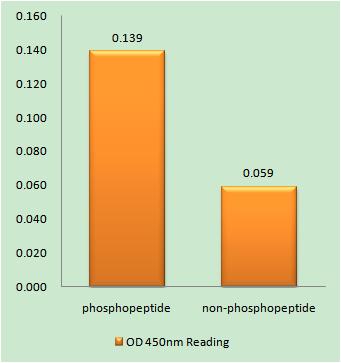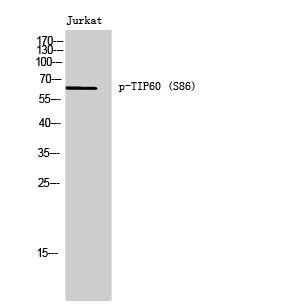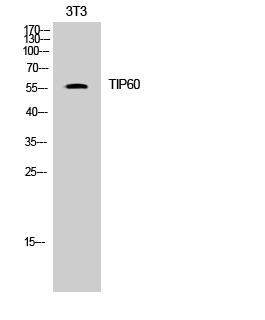TIP60 (phospho Ser90) Polyclonal Antibody
- 货号:YP1111
- 应用:IHC;IF;ELISA
- 种属:Human;Mouse;Rat
- 靶点:
- TIP60
- 简介:
- >>Spinocerebellar ataxia;>>Human T-cell leukemia virus 1 infection
- 基因名称:
- KAT5
- 蛋白名称:
- Histone acetyltransferase KAT5
- Human Gene Id:
- 10524
- Human Swiss Prot No:
- Q92993
- Mouse Gene Id:
- 81601
- Mouse Swiss Prot No:
- Q8CHK4
- Rat Gene Id:
- 192218
- Rat Swiss Prot No:
- Q99MK2
- 免疫原:
- The antiserum was produced against synthesized peptide derived from human Tip60 around the phosphorylation site of Ser90. AA range:56-105
- 特异性:
- Phospho-TIP60 (S90) Polyclonal Antibody detects endogenous levels of TIP60 protein only when phosphorylated at S90.
- 组成:
- Liquid in PBS containing 50% glycerol, 0.5% BSA and 0.02% sodium azide.
- 来源:
- Polyclonal, Rabbit,IgG
- 稀释:
- IHC 1:100 - 1:300. ELISA: 1:5000.. IF 1:50-200
- 纯化工艺:
- The antibody was affinity-purified from rabbit antiserum by affinity-chromatography using epitope-specific immunogen.
- 浓度:
- 1 mg/ml
- 储存:
- -15°C to -25°C/1 year(Do not lower than -25°C)
- 其他名称:
- KAT5;HTATIP;TIP60;Histone acetyltransferase KAT5;60 kDa Tat-interactive protein;Tip60;Histone acetyltransferase HTATIP;HIV-1 Tat interactive protein;Lysine acetyltransferase 5;cPLA(2)-interacting protein
- 分子量:
- 59kD
- 背景:
- The protein encoded by this gene belongs to the MYST family of histone acetyl transferases (HATs) and was originally isolated as an HIV-1 TAT-interactive protein. HATs play important roles in regulating chromatin remodeling, transcription and other nuclear processes by acetylating histone and nonhistone proteins. This protein is a histone acetylase that has a role in DNA repair and apoptosis and is thought to play an important role in signal transduction. Alternative splicing of this gene results in multiple transcript variants. [provided by RefSeq, Jul 2008],
- 功能:
- negative regulation of transcription from RNA polymerase II promoter, regulation of cytokine production, negative regulation of cytokine production, DNA metabolic process, DNA repair, double-strand break repair, chromatin organization, chromatin assembly or disassembly, transcription, regulation of transcription, DNA-dependent, regulation of transcription from RNA polymerase II promoter, protein amino acid acetylation, response to DNA damage stimulus,DNA damage response, signal transduction by p53 class mediator resulting in transcription of p21 class mediator,intracellular signaling cascade, negative regulation of biosynthetic process, positive regulation of biosynthetic process,regulation of specific transcription from RNA polymerase II promoter, negative regulation of specific transcription from RNA polymerase II promoter, positive regulation of macromolecule biosynthetic process, neg
- 细胞定位:
- Nucleus . Chromosome . Cytoplasm . Chromosome, centromere, kinetochore . Cytoplasm, cytoskeleton, spindle pole . Nucleus, nucleolus . Cytoplasm, perinuclear region . Upon stimulation with EDN1, it is exported from the nucleus to the perinuclear region and UV irradiation induces translocation into punctuate subnuclear structures named nuclear bodies (PubMed:11262386). Transiently localizes to kinetochores in early mitosis (PubMed:26829474). Localizes to spindle poles when chromosomes align during metaphase (PubMed:34608293). Localizes in the cytoplasm and nucleus of round spermatids (By similarity). .
- 组织表达:
- Brain,
- June 19-2018
- WESTERN IMMUNOBLOTTING PROTOCOL
- June 19-2018
- IMMUNOHISTOCHEMISTRY-PARAFFIN PROTOCOL
- June 19-2018
- IMMUNOFLUORESCENCE PROTOCOL
- September 08-2020
- FLOW-CYTOMEYRT-PROTOCOL
- May 20-2022
- Cell-Based ELISA│解您多样本WB检测之困扰
- July 13-2018
- CELL-BASED-ELISA-PROTOCOL-FOR-ACETYL-PROTEIN
- July 13-2018
- CELL-BASED-ELISA-PROTOCOL-FOR-PHOSPHO-PROTEIN
- July 13-2018
- Antibody-FAQs
- 产品图片

- Enzyme-Linked Immunosorbent Assay (Phospho-ELISA) for Immunogen Phosphopeptide (Phospho-left) and Non-Phosphopeptide (Phospho-right), using Tip60 (Phospho-Ser90) Antibody

- Immunohistochemistry analysis of paraffin-embedded human brain, using Tip60 (Phospho-Ser90) Antibody. The picture on the right is blocked with the phospho peptide.



